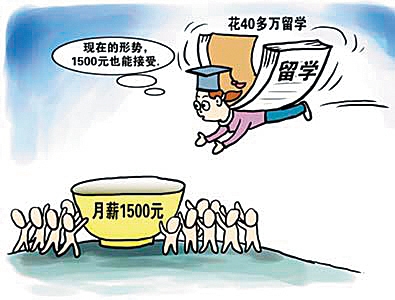(单词翻译:单击)
It's generally assumed that China's job market favors overseas returnees, high academic achievers and single candidates, but the trends are changing. Investigations at job fairs found that some traditional advantages are no longer prized by employers, the Beijing Morning News reported.
据北京晨报报道,记者走访多场招聘会后发现,留学“海归”和高学历等传统就业观念中的优势条件不再受雇主的青睐,正面临着挑战。
Candidates with higher education are not necessarily favored over undergraduates. For example, PhDs don't always beat young undergraduates in terms of quick thinking and physical endurance, according to the newspaper.
高学历不一定比本科生吃香,比如在思维活跃和精力充沛方面,博士生和年轻的本科生相比未必有优势。
An HR representative from an Internet company said they prefer undergraduates for operation and product positions. Only for technical positions that have high requirements would they consider highly certified candidates.
一名来自互联网公司的人力资源代表表示,在产品和运营方面的职位上,他们会更青睐于本科生。只有在有高要求的技术职位,他们才会考虑高学历应聘者。

Another reason is that PhDs generally ask for higher salaries. But for some industries and positions, they basically create similar value as undergraduates, so for employers the PhD's halo does not seem so competitive, added the report.
博士生不占有优势的另一个原因是,他们往往要求高薪资,而对于一些企业和职位来说,高学历人士创造的价值和本科生并无多大差异,所以博士生的光环似乎并没有竞争力。
Overseas returnees face a similar dilemma: some companies feel that overseas experience does not necessarily pose a great advantage these days. They cite reasons for being turned down such as lack of local experience and high payment requirements.
出国留学的“海归”也遭遇了类似的尴尬:如今出国留学经历在部分用人单位并没有加多少分,“海归”们反而因为没有国内实践经验、薪水要求高等原因屡屡应聘受挫。
Wei Bin, director of the career guidance center at the University of International Relations, said nowadays the number of overseas students is huge, but the student quality is mixed.
国际关系学院就业指导部门主任魏斌说道,如今留学生数量很多,但其质量也是鱼龙混杂,参差不齐。
Some experts also attribute the decreasing job competitiveness of overseas returnees and PhDs to a growing oversupply of their number. Instead, blue-collar positions which require less education and more technical training are becoming more sought-after.
一些专家认为,“海归”和博士生的求职优势不再突出与其总量越来越多,供大于求也有关系。相反,需要接受较少教育但却要求更多的技术培训的蓝领岗位变得越来越抢手。
The new trends reflect that, with employers becoming more rational and practical, shiny labels no longer hold the same attraction. So students need to exercise good sense when choosing majors and careers. Instead of following hot trends, they should choose the most suitable career path based on accurate self-assessment, the report suggested.
最近的就业趋势反映出,随着用人单位变得越来越理性,光鲜的“标签”已经失去以往的吸引力。所以,学生在选择自己的专业和职业方向时也应该理性考虑。毕业生应该做好个人评估选择适合自身的就业方向,而不是一窝蜂似的追随热门行业。


